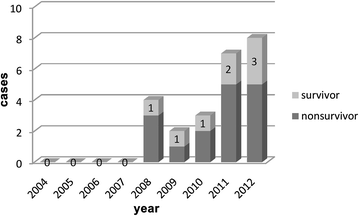Extracorporeal cardiopulmonary resuscitation for adult patients who underwent post-cardiac surgery
- PMID: 26459158
- PMCID: PMC4603352
- DOI: 10.1186/s40001-015-0179-4
Extracorporeal cardiopulmonary resuscitation for adult patients who underwent post-cardiac surgery
Abstract
Background: Refractory cardiac arrest (CA) occasionally develops in patients after cardiac surgery.
Objective: To examine the clinical outcomes of extracorporeal cardiopulmonary resuscitation (ECPR) in adult patients with post-cardiotomy CA.
Methods: This was a retrospective study of the 9-year experience (from January 2004 to May 2012) of the Beijing Anzhen Hospital with ECPR in adult patients with post-cardiotomy CA. At this hospital, a dedicated ECPR team is available 24/7 for emergency cases requiring ECPR. Demographic data, biochemical data, survival, morbidity, and complications were examined before, during, and after ECPR. Outcomes were compared between survivors and non-survivors.
Results: Twenty-four adult patients (19 men and 5 women; mean age: 59.3 ± 11.9 years) received ECPR support for post-cardiotomy CA. The cardiac surgery procedures included coronary artery bypass grafting (n = 20, 83.3 %), valvular surgery alone (n = 2, 8.3 %), and correction of congenital heart defects (n = 2, 8.3 %). The mean extracorporeal membrane oxygenation (ECMO) duration was 115.23 ± 70.17 h. Twenty-one patients received ECPR after intra-aortic balloon pump, and three patients received ECPR directly. The main cause of mortality was multiple system organ failure (n = 12, 50.0 %). Approximately one-half of non-survivors had severe neurologic impairments. Among 16 patients who were weaned off ECMO support, eight patients survived to hospital discharge.
Conclusions: ECPR can be effective for partial cardiopulmonary support to resuscitate adult patients suffering from refractory CA after cardiac surgery. Improvement in outcomes of patients who received ECPR requires a multidisciplinary approach to protect organ function and limit organ injury before and during cardiac support.
Similar articles
-
Post-cardiotomy extracorporeal cardiopulmonary resuscitation in neonates with complex single ventricle: analysis of outcomes.Eur J Cardiothorac Surg. 2011 Dec;40(6):1396-405; discussion 1405. doi: 10.1016/j.ejcts.2011.01.087. Epub 2011 Apr 20. Eur J Cardiothorac Surg. 2011. PMID: 21507672
-
Extracorporeal cardiopulmonary resuscitation for pediatric cardiac patients.Ann Thorac Surg. 2012 Sep;94(3):874-9; discussion 879-80. doi: 10.1016/j.athoracsur.2012.04.040. Epub 2012 Jun 13. Ann Thorac Surg. 2012. PMID: 22698774
-
Outcomes of extracorporeal cardiopulmonary resuscitation for refractory cardiac arrest in adult cardiac surgery patients.J Thorac Cardiovasc Surg. 2016 Oct;152(4):1133-9. doi: 10.1016/j.jtcvs.2016.06.014. Epub 2016 Jun 23. J Thorac Cardiovasc Surg. 2016. PMID: 27422361
-
Comparing extracorporeal cardiopulmonary resuscitation with conventional cardiopulmonary resuscitation: A meta-analysis.Resuscitation. 2016 Jun;103:106-116. doi: 10.1016/j.resuscitation.2016.01.019. Epub 2016 Feb 2. Resuscitation. 2016. PMID: 26851058 Review.
-
Conditions and procedures for in-hospital extracorporeal life support (ECLS) in cardiopulmonary resuscitation (CPR) of adult patients.Perfusion. 2016 Apr;31(3):182-8. doi: 10.1177/0267659115591622. Epub 2015 Jun 16. Perfusion. 2016. PMID: 26081929 Review.
Cited by
-
Understanding the "extracorporeal membrane oxygenation gap" in veno-arterial configuration for adult patients: Timing and causes of death.Artif Organs. 2021 Oct;45(10):1155-1167. doi: 10.1111/aor.14006. Epub 2021 Jul 6. Artif Organs. 2021. PMID: 34101843 Free PMC article.
-
Structured review of post-cardiotomy extracorporeal membrane oxygenation: part 1-Adult patients.J Heart Lung Transplant. 2019 Nov;38(11):1125-1143. doi: 10.1016/j.healun.2019.08.014. Epub 2019 Aug 10. J Heart Lung Transplant. 2019. PMID: 31522913 Free PMC article. Review.
-
Comparison of extracorporeal and conventional cardiopulmonary resuscitation: A meta-analysis of 2 260 patients with cardiac arrest.World J Emerg Med. 2017;8(1):5-11. doi: 10.5847/wjem.j.1920-8642.2017.01.001. World J Emerg Med. 2017. PMID: 28123613 Free PMC article.
-
[Cardiac arrest under special circumstances].Notf Rett Med. 2021;24(4):447-523. doi: 10.1007/s10049-021-00891-z. Epub 2021 Jun 10. Notf Rett Med. 2021. PMID: 34127910 Free PMC article. Review. German.
References
-
- Golding LA. Postcardiotomy mechanical support. Semin Thorac Cardiovasc Surg. 1991;3:29–32. - PubMed
Publication types
MeSH terms
LinkOut - more resources
Full Text Sources
Other Literature Sources
Medical


